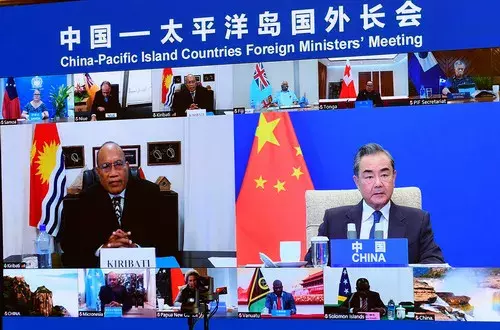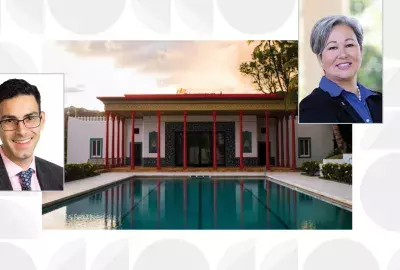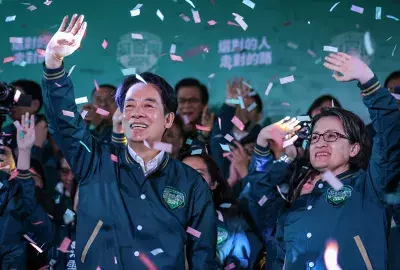Error message

OFFICE/DEPARTMENT
By Lili Song
OTAGO, New Zealand (Dec. 3, 2021) – Recently, Chinese Foreign Minister Wang Yi met via video link with high-ranking officials from nine Pacific island countries and the Secretary General of the Pacific Islands Forum in the first-ever China-Pacific Foreign Ministers' Meeting. The October 21 meeting, which has received only limited coverage in non-Chinese media, sheds some new light on China’s strategy in the Pacific, which has been the subject of considerable interest in recent years.
The meeting clearly signals China’s intention to deepen its relations with Pacific island countries, or PICs, beyond economic dimensions. One researcher with the Taiwan Institute of National Defense and Security Research has even suggested that the meeting can be considered to mark the starting point of a new effort by Beijing to build a “pro-China bloc” in the Pacific.
According to a press release by the Chinese foreign ministry, participants in the meeting had an in-depth exchange on elevating the comprehensive strategic partnership between the two sides to a new level. One official Chinese Communist Party newspaper in Shanghai compared the meeting to earlier milestones in China-Pacific relations such as President Xi Jinping’s meetings with Pacific island leaders and the first ministerial meeting of China-PICs Economic Development & Cooperation Forum in 2006.
12-point joint statement
The October meeting led to a 12-point joint statement. One notable outcome is the agreement to hold similar meetings on a regular, ongoing basis, which may help increase China’s political influence in the Pacific. The participants also agreed to “step up communication and collaboration in the UN and other multilateral institutions” on major topics such as implementation of the 2030 Agenda for Sustainable Development, reform of the UN Security Council, and response to climate change.
[pullquote]The joint statement shows that the two sides managed to find some common ground in matters of top concern among the PICs[/pullquote], including COVID response, climate change, nuclear-related issues, development, and marine environment and resources. Signalling Beijing’s desire to be seen as a committed partner for the PICs, China pledged to set up a reserve of emergency supplies to assist in their fight against COVID-19, as well as centers for cooperation in climate change, poverty reduction and development. It also promised to hold a China-PICs fisheries cooperation and development forum before the end of the year.
AUKUS reaction
The Foreign Ministers' Meeting is clearly an “upgrade” from earlier meetings that had taken place at the vice-ministerial level. And it may be no coincidence that it was held just over a month after the AUKUS nuclear submarine deal between the US, Australia and Britain. Indeed, Wang Yi criticized the AUKUS deal during the meeting, warning that it would “create risks of nuclear proliferation … cause an arms race, and jeopardize regional peace and stability.”
Although the joint statement from the Foreign Ministers' Meeting makes no direct reference to AUKUS, it expresses the two sides’ firm commitment to the South Pacific Nuclear Free Zone Treaty and calls on the relevant parties “to fulfill treaty obligations and promote regional peace.”
Navigating relationships
The tendency for Australia and the US to react to what China does in the Pacific is arguably zero-sum thinking that may have the effect of allowing Beijing to control the narrative and optics in the perceived rivalry. [pullquote]Ultimately, Pacific island leaders will continue to navigate their relationships with both China and Western strategic partners in the ways that they see as most beneficial to their communities.[/pullquote] Any country that routinely ignores the PICs’ priorities or disrespects their traditions and values is unlikely to be their partner of choice.
But when it comes to the critical issue of climate change, there is a clear need for all countries to work together. As Federated States of Micronesia President David Panuelo noted in a statement following the October meeting: “[n]either China nor the United States can fix climate change alone, but if our two allies work together, convincing other allies like Australia to come on board, and friends like Brazil to do more, we can still save humanity.”
Dr. Lili Song teaches law at the University of Otago in New Zealand, including specialities in both Pacific and Chinese law. She previously taught at the University of the South Pacific in Vanuatu.
Photo: PRC Ministry of Foreign Affairs
By Lili Song
OTAGO, New Zealand (Dec. 3, 2021) – Recently, Chinese Foreign Minister Wang Yi met via video link with high-ranking officials from nine Pacific island countries and the Secretary General of the Pacific Islands Forum in the first-ever China-Pacific Foreign Ministers' Meeting. The October 21 meeting, which has received only limited coverage in non-Chinese media, sheds some new light on China’s strategy in the Pacific, which has been the subject of considerable interest in recent years.
The meeting clearly signals China’s intention to deepen its relations with Pacific island countries, or PICs, beyond economic dimensions. One researcher with the Taiwan Institute of National Defense and Security Research has even suggested that the meeting can be considered to mark the starting point of a new effort by Beijing to build a “pro-China bloc” in the Pacific.
According to a press release by the Chinese foreign ministry, participants in the meeting had an in-depth exchange on elevating the comprehensive strategic partnership between the two sides to a new level. One official Chinese Communist Party newspaper in Shanghai compared the meeting to earlier milestones in China-Pacific relations such as President Xi Jinping’s meetings with Pacific island leaders and the first ministerial meeting of China-PICs Economic Development & Cooperation Forum in 2006.
12-point joint statement
The October meeting led to a 12-point joint statement. One notable outcome is the agreement to hold similar meetings on a regular, ongoing basis, which may help increase China’s political influence in the Pacific. The participants also agreed to “step up communication and collaboration in the UN and other multilateral institutions” on major topics such as implementation of the 2030 Agenda for Sustainable Development, reform of the UN Security Council, and response to climate change.
[pullquote]The joint statement shows that the two sides managed to find some common ground in matters of top concern among the PICs[/pullquote], including COVID response, climate change, nuclear-related issues, development, and marine environment and resources. Signalling Beijing’s desire to be seen as a committed partner for the PICs, China pledged to set up a reserve of emergency supplies to assist in their fight against COVID-19, as well as centers for cooperation in climate change, poverty reduction and development. It also promised to hold a China-PICs fisheries cooperation and development forum before the end of the year.
AUKUS reaction
The Foreign Ministers' Meeting is clearly an “upgrade” from earlier meetings that had taken place at the vice-ministerial level. And it may be no coincidence that it was held just over a month after the AUKUS nuclear submarine deal between the US, Australia and Britain. Indeed, Wang Yi criticized the AUKUS deal during the meeting, warning that it would “create risks of nuclear proliferation … cause an arms race, and jeopardize regional peace and stability.”
Although the joint statement from the Foreign Ministers' Meeting makes no direct reference to AUKUS, it expresses the two sides’ firm commitment to the South Pacific Nuclear Free Zone Treaty and calls on the relevant parties “to fulfill treaty obligations and promote regional peace.”
Navigating relationships
The tendency for Australia and the US to react to what China does in the Pacific is arguably zero-sum thinking that may have the effect of allowing Beijing to control the narrative and optics in the perceived rivalry. [pullquote]Ultimately, Pacific island leaders will continue to navigate their relationships with both China and Western strategic partners in the ways that they see as most beneficial to their communities.[/pullquote] Any country that routinely ignores the PICs’ priorities or disrespects their traditions and values is unlikely to be their partner of choice.
But when it comes to the critical issue of climate change, there is a clear need for all countries to work together. As Federated States of Micronesia President David Panuelo noted in a statement following the October meeting: “[n]either China nor the United States can fix climate change alone, but if our two allies work together, convincing other allies like Australia to come on board, and friends like Brazil to do more, we can still save humanity.”
Dr. Lili Song teaches law at the University of Otago in New Zealand, including specialities in both Pacific and Chinese law. She previously taught at the University of the South Pacific in Vanuatu.
Photo: PRC Ministry of Foreign Affairs
East-West Wire
News, Commentary, and Analysis
The East-West Wire is a news, commentary, and analysis service provided by the East-West Center in Honolulu. Any part or all of the Wire content may be used by media with attribution to the East-West Center or the person quoted. To receive East-West Center Wire media releases via email, subscribe here.
For links to all East-West Center media programs, fellowships and services, see www.eastwestcenter.org/journalists.







